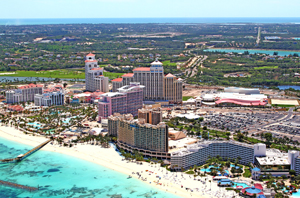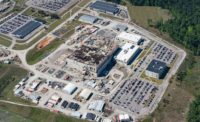
A development company building a $3.5-billion, nearly complete Bahamas resort project has filed for bankruptcy protection while allegedly still owing a subsidiary of China Construction America (CCA) $72 million for its work.
With the two parties seemingly readying for a legal battle, on July 7 the prime minister of the Bahamas, Perry Gladstone Christie, issued a call for mediated negotiations, as soon as this weekend. In a statement he posted to Facebook, Christie asserted that CCA had agreed to participate in negotiations, and urged Baha Mar to accept the offer as well.
"I want all involved to put aside the antics of the past several days and meet with a clean slate and with cool heads,” read Christie’s statement. “The meetings must result in an intact and formally signed agreement on an action plan for the completion of the project."
When Baha Mar Ltd.—headed by Sarkis Izmirlian—and its subsidiaries filed for Chapter 11 bankruptcy protection on June 29 in U.S. Bankruptcy Court in Delaware, the group blamed the contractor for the project’s construction delays and for the slowing of financing to the developer.
In a July 7 statement, CCA Bahamas fired back, asserting: “Baha Mar Ltd.'s decision to file for bankruptcy protection is the direct result of its failure to secure adequate financing and its mismanagement of the design of Baha Mar resort project."
The contractor, with its U.S. operations based in New Jersey, also cited Baha Mar’s replacement of the “principal architect” after the start of construction, the “late and incomplete delivery of design packages” and more than 1,300 construction change directives for the project’s still-lagging completion.
It is unclear what CCA meant related to the replacement of the principal architect, and the company did not respond to repeated requests by ENR for clarification. At the start of construction, the developer had listed RMJM Architecture as the project’s designer. Currently, the Baha Mar resort's website lists Michael Hong Architects of Culver City, Calif., as master planner and principal design architect, with Dianna Wong Architecture + Interior Design listed as “architect.” Another project team member, Thornton Tomasetti, describes the "project team" on its website as including Michael Hong Architects and RMJM.
Characterizing the developer’s attempts to blame contractors for the delayed opening—originally set for December 2014—as "misleading and dishonest," the contractor stated: "Since February 2015, CCA Bahamas and our subcontractors have performed nearly $72 million of contract work for which we have received no payment.” The company further estimated that it has advanced roughly $220 million to the project.
Baha Mar hired CCA as general contractor after it secured financing from the Export-Import Bank of China. Baha Mar's court filings detailed the project’s $3.5 billion of financing as including a $2.45-billion secured debt facility provided by the China EXIM Bank, as well as a $150-million preferred equity commitment provided by a subsidiary of China State Construction Engineering Corp. Ltd.
Meanwhile, the developer describes its now nearly $900-million investment as a “common equity investment” consisting of cash, land and three hotels that previously operated on the property, as well as “other commitments."
During its construction, which began in February 2011, Baha Mar Ltd. and others touted the 3.3-million-sq-ft development as “the largest single-phase resort project in the Western Hemisphere.” The resort, which comprises between 600 and 1000 acres in Nassau’s Cable Beach area, includes 2,323 guest rooms across four hotels, reportedly ranging from 11 to 28 stories tall; an approximately 100,000-sq-ft casino; and a roughly 200,000-sq-ft convention center.
According to the developer’s filings—as Northshore Mainland Services—the project is “more than 97% complete,” with remaining work involving the convention center, among other items.
This is not the first time that Izmirlian has sought to re-set Baha Mar-related debts. In October 2010, Baha Mar announced via Facebook that the company had reached a settlement with a “ScotiaBank-led syndicate” over reportedly $200 million in loans related to its acquisition of numerous properties in the Cable Beach area, starting around 2005. In the 2010 announcement, Baha Mar Chairman and CEO Izmirlian announced that the banking syndicate had become an “equity participant” in the project.
The recent legal skirmish isn’t the project’s first brush with controversy, either. Around the time of the project’s start of construction, in early 2011, ENR reported that CCA’s parent company, China State Construction Engineering Corp., had requested permits for 8,150 foreign workers, presumably mostly Chinese. Later reports, by the Wall Street Journal and others, cited the number of foreign workers at approximately 4,000.
According to the developer’s court filings, the resort began hiring hotel workers in early 2015, and has more than 2,000 employees on staff currently, for an average monthly payroll of $7.5 million.
As of July 15, some of the firms to have filed claims to Baha Mar include: Jaros, Baum & Bolles (mechanical and electrical consultant), $1,802,117; Acomb Ostendorf & Associates LLC (hospitality consultant), $321,052; Architectural Brass, $258,510; Pureti Bahamas Ltd., $132,456; Advanced Gaming Associates, $126,342; DHP Associates (cost estimating), $56,995; Executive Coffee & Foods, $44,104; All Wood Fine Interiors Ltd., $38,545; KPRD Fire Protection Engineering, $38,435; O Design Services, $35,096; Gaming Laboratories International, $25,515; TAI Architecture & Design, $23,909; Harris Civil Engineers LLC, $10,025.92; and Contingency Telecom Auditing, $7,173.
Update:
On July 13, Baha Mar Ltd. issued a statement indicating it would participate in negotiations with the contractor, with the talks scheduled to take place in China. The company's statement read, in part: "It is clear that we and our government in The Bahamas recognize the importance to The Bahamas of completing construction and successfully opening Baha Mar as soon as possible. We appreciate the government's efforts to try to help all parties work together to achieve a consensual resolution in a timely manner. We at Baha Mar want this, have an urgency to reach an appropriate resolution, and look forward to participating in discussions this week in China. As the government of The Bahamas has made clear in communications with us, the discussions to achieve the resolution are directly between the private parties—Baha Mar; China State Construction, the general contractor and its affiliates; and the lender, the Export-Import Bank of China, with the Bahamian government volunteering to be neutral in this process."




Post a comment to this article
Report Abusive Comment